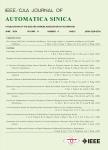Observer-Based Adaptive Robust Precision Motion Control of a Multi-Joint Hydraulic Manipulator
作者机构:State Key Laboratory of Fluid Power and Mechatronic SystemsZhejiang UniversityHangzhou 310027 Ocean CollegeZhejiang UniversityZhoushan 316021China School of Mechanical EngineeringShijiazhuang Tiedao UniversityShijiazhuang 050000 State Key Laboratory of Fluid Power and Mechatronic SystemsZhejiang UniversityHangzhou 310027China School of Mechanical EngineeringPurdue UniversityWest LafayetteIN 47907 USA
出 版 物:《IEEE/CAA Journal of Automatica Sinica》 (自动化学报(英文版))
年 卷 期:2024年第11卷第5期
页 面:1213-1226页
核心收录:
学科分类:080202[工学-机械电子工程] 08[工学] 0804[工学-仪器科学与技术] 0835[工学-软件工程] 0802[工学-机械工程] 080201[工学-机械制造及其自动化]
基 金:supported by the National Natural Science Foundation of China(52075476,52105065,92048302) Zhejiang Provincial Natural Science Foundation of China(LR23E050001) the Science and Technology Program of Hebei(E2021210011)
摘 要:Hydraulic manipulators are usually applied in heavy-load and harsh operation ***,when faced with a complex operation,the traditional proportional-integral-derivative(PID)control may not meet requirements for high control ***-based full-state-feedback control is an effective alternative,but the states of a hydraulic manipulator are not always available and reliable in practical applications,particularly the joint angular velocity *** that it is not suitable to obtain the velocity signal directly from differentiating of position measurement,the low-pass filtering is commonly used,but it will definitely restrict the closed-loop bandwidth of the whole *** avoid this problem and realize better control performance,this paper proposes a novel observerbased adaptive robust controller(obARC)for a multi-joint hydraulic manipulator subjected to both parametric uncertainties and the lack of accurate velocity ***,a nonlinear adaptive observer is first designed to handle the lack of velocity measurement with the consideration of parametric ***,the adaptive robust control is developed to compensate for the dynamic uncertainties,and the close-loop system robust stability is theoretically proved under the observation and control ***,comparative experiments are carried out to show that the designed controller can achieve a performance improvement over the traditional methods,specifically yielding better control accuracy owing to the closed-loop bandwidth breakthrough,which is limited by low-pass filtering in fullstate-feedback control.



